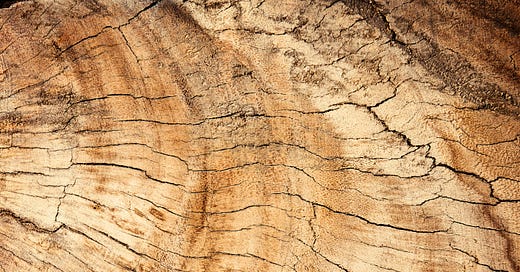“The Spar Tree” first appeared in Rooted: The Best New Arboreal Nonfiction
One time I was in the woods near the ocean in Oregon
When I saw a truly immense stump looming in the sea
Of lesser green. Gray as bone, and shorn of everything,
It was still twice as vast as even the hemlock in ravines
Where they were safe from loggers without helicopters.
That’s your spar tree, a friend told me. He was a logger
When he was young and strong ten thousand years ago,
As he said, mostly with a grin. Your spar, he’s the boss
Of the woods, the strongest of them all, we’d knock his
Head off and set block and tackle on him and run cable
Through him for the whole operation, and then left him
Be. Sometimes guys would want to cut him too, finally,
Heck, there’s a lot of log there, but that wasn’t our way.
There was things done and not done from some respect.
Like a lot of things, the spar tree came to have meaning
Only after people didn’t use it for work anymore, right?
So these people who don’t know what they don’t know,
They say it’s a symbol of muscle and heroism and such,
But that’s silly. For the guys who cut and worked a spar,
He kind of was the woods, you know what I mean here?
And you treated him with respect. The woods could kill
Guys and did so regular, and you wanted to treat it right.
This sounds like touchy feely stuff, but it was damn real
To the men in the woods. The woods was alive. It knew
Full well what was happening and if you worked casual
You got dead quick. This is why when we finished a job
Each guy touched the spar with respect, kind of a thanks,
I guess, for not killing guys, and for giving us the timber.
It was just sort of the thing we did. There was other stuff,
But it would take me another ten thousand years to tell it.
Brian Doyle (1956-2017) was the longtime editor of Portland Magazine at the University of Portland, in Oregon. He was the author of six collections of essays, two nonfiction books, two collections of “proems,” the short story collection Bin Laden’s Bald Spot, the novella Cat’s Foot, and the novels Mink River, The Plover, and Martin Marten. He is also the editor of several anthologies, including Ho`olaule`a, a collection of writing about the Pacific islands. Doyle’s books have seven times been finalists for the Oregon Book Award, and his essays have appeared in The Atlantic Monthly, Harper’s, Orion, The American Scholar, The Sun, The Georgia Review, and in newspapers and magazines around the world, including The New York Times, The Times of London, and The Age (in Australia). His essays have also been reprinted in the annual Best American Essays, Best American Science & Nature Writing, and Best American Spiritual Writing anthologies. Among various honors for his work is a Catholic Book Award, three Pushcart Prizes, the John Burroughs Award for Nature Essays, Foreword Reviews’ Novel of the Year award in 2011, and the Award in Literature from the American Academy of Arts and Letters in 2008 (previous recipients include Saul Bellow, Kurt Vonnegut, Flannery O’Connor, and Mary Oliver).”



